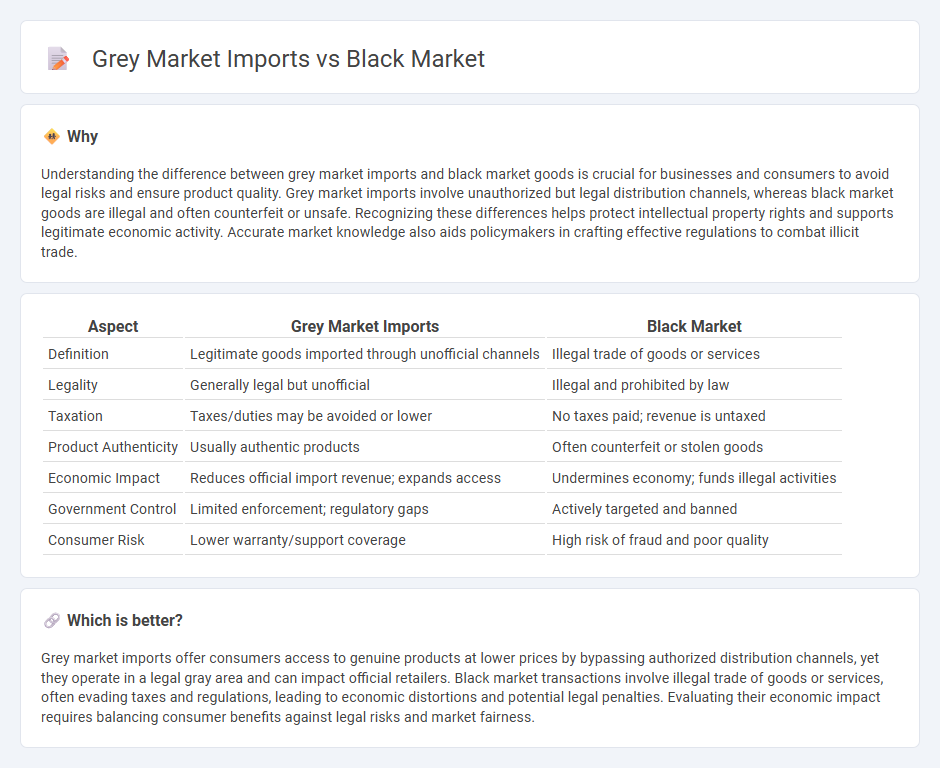
Grey market imports involve the trade of genuine products through unauthorized channels, often bypassing official distribution networks but remaining legal, while black market activities encompass the illegal trading of goods and services, frequently evading taxes and regulations. The economic impact of grey market imports includes price competition and consumer access to diverse products, whereas black market operations can undermine legal economies and fuel illicit activities. Explore more to understand the nuanced effects of these markets on global economies.
Why it is important
Understanding the difference between grey market imports and black market goods is crucial for businesses and consumers to avoid legal risks and ensure product quality. Grey market imports involve unauthorized but legal distribution channels, whereas black market goods are illegal and often counterfeit or unsafe. Recognizing these differences helps protect intellectual property rights and supports legitimate economic activity. Accurate market knowledge also aids policymakers in crafting effective regulations to combat illicit trade.
Comparison Table
| Aspect | Grey Market Imports | Black Market |
|---|---|---|
| Definition | Legitimate goods imported through unofficial channels | Illegal trade of goods or services |
| Legality | Generally legal but unofficial | Illegal and prohibited by law |
| Taxation | Taxes/duties may be avoided or lower | No taxes paid; revenue is untaxed |
| Product Authenticity | Usually authentic products | Often counterfeit or stolen goods |
| Economic Impact | Reduces official import revenue; expands access | Undermines economy; funds illegal activities |
| Government Control | Limited enforcement; regulatory gaps | Actively targeted and banned |
| Consumer Risk | Lower warranty/support coverage | High risk of fraud and poor quality |
Which is better?
Grey market imports offer consumers access to genuine products at lower prices by bypassing authorized distribution channels, yet they operate in a legal gray area and can impact official retailers. Black market transactions involve illegal trade of goods or services, often evading taxes and regulations, leading to economic distortions and potential legal penalties. Evaluating their economic impact requires balancing consumer benefits against legal risks and market fairness.
Connection
Grey market imports involve the unauthorized but legal distribution of goods through unofficial channels, often bypassing official tariffs and regulations, which creates a parallel economy. Black markets operate illegally by trading goods and services prohibited or heavily regulated by the state, fueling underground economic activities. Both markets undermine formal economic structures, distort trade statistics, and contribute to revenue loss for governments due to evasion of taxes and duties.
Key Terms
Legality
Black market imports involve the illegal trade of goods that evade customs duties, violate safety regulations, or infringe copyrights, making their possession and sale unlawful under most jurisdictions. Grey market imports, while not illegal, consist of genuine products sold through unauthorized channels, bypassing authorized distributors but complying with legal standards and import regulations. Explore detailed distinctions and legal implications to understand the impact of these import practices on consumers and businesses.
Regulatory compliance
Black market imports violate customs laws and evade regulatory compliance, resulting in illegal goods entering the market without proper taxation or safety checks. Grey market imports operate within legal frameworks but bypass authorized distribution channels, often leading to issues with warranty and product support due to lack of manufacturer approval. Explore the key regulatory distinctions and compliance challenges between black and grey market imports to understand their impact on trade and consumer protection.
Price control
Black market imports circumvent legal price controls, resulting in unregulated and often lower-priced goods that undermine official market standards. Grey market imports operate within legal frameworks but exploit price differentials between countries, offering consumers cheaper alternatives without violating laws. Explore more about the impact of price control differences on black and grey market dynamics.
Source and External Links
Black market - Wikipedia - A black market is an illegal or clandestine market that operates outside government regulations, often involving goods or services that are prohibited or heavily controlled, including counterfeit goods and unregulated services.
Black Market (@blackmarket_la) * Instagram - Black Market here refers to a brand or store featuring apparel and art, unrelated to the clandestine illicit trade meaning of black market.
White House Black Market: Shop Women's Clothing, Petite ... - White House Black Market is a retailer offering women's clothing distinguished by black and white fashion styles, not connected to the concept of an illegal black market.
 dowidth.com
dowidth.com